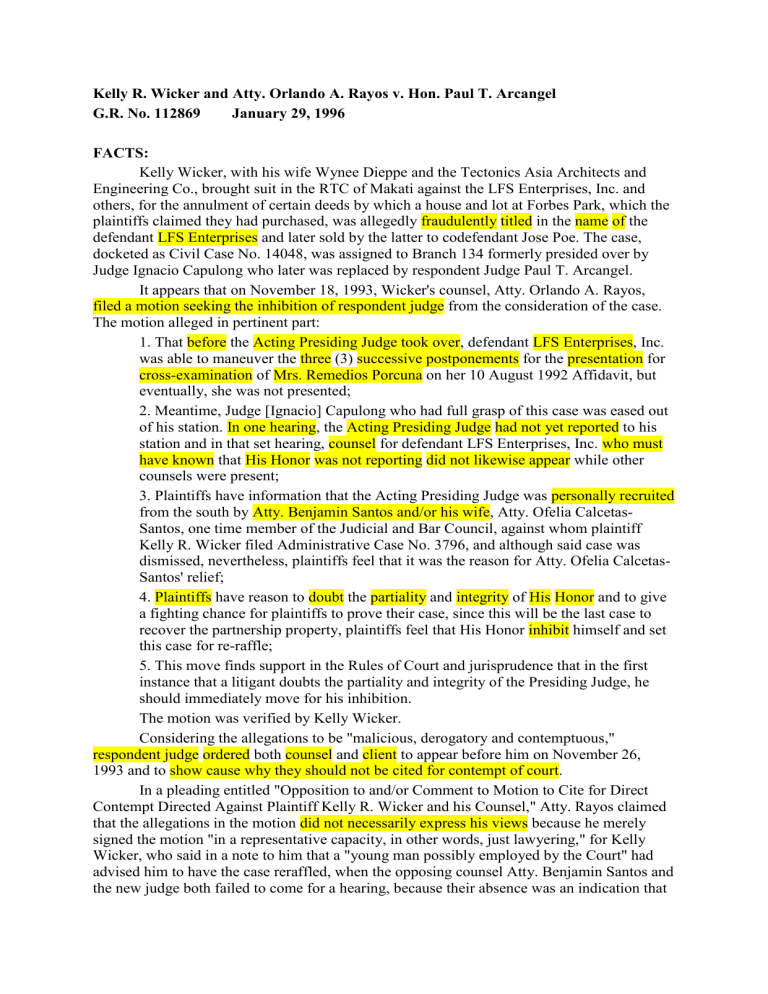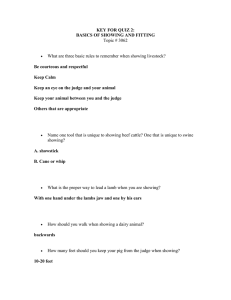11 Kelly R. Wicker and Atty. Orlando A. Rayos v. Hon. Paul T. Arcangel
advertisement

Kelly R. Wicker and Atty. Orlando A. Rayos v. Hon. Paul T. Arcangel G.R. No. 112869 January 29, 1996 FACTS: Kelly Wicker, with his wife Wynee Dieppe and the Tectonics Asia Architects and Engineering Co., brought suit in the RTC of Makati against the LFS Enterprises, Inc. and others, for the annulment of certain deeds by which a house and lot at Forbes Park, which the plaintiffs claimed they had purchased, was allegedly fraudulently titled in the name of the defendant LFS Enterprises and later sold by the latter to codefendant Jose Poe. The case, docketed as Civil Case No. 14048, was assigned to Branch 134 formerly presided over by Judge Ignacio Capulong who later was replaced by respondent Judge Paul T. Arcangel. It appears that on November 18, 1993, Wicker's counsel, Atty. Orlando A. Rayos, filed a motion seeking the inhibition of respondent judge from the consideration of the case. The motion alleged in pertinent part: 1. That before the Acting Presiding Judge took over, defendant LFS Enterprises, Inc. was able to maneuver the three (3) successive postponements for the presentation for cross-examination of Mrs. Remedios Porcuna on her 10 August 1992 Affidavit, but eventually, she was not presented; 2. Meantime, Judge [Ignacio] Capulong who had full grasp of this case was eased out of his station. In one hearing, the Acting Presiding Judge had not yet reported to his station and in that set hearing, counsel for defendant LFS Enterprises, Inc. who must have known that His Honor was not reporting did not likewise appear while other counsels were present; 3. Plaintiffs have information that the Acting Presiding Judge was personally recruited from the south by Atty. Benjamin Santos and/or his wife, Atty. Ofelia CalcetasSantos, one time member of the Judicial and Bar Council, against whom plaintiff Kelly R. Wicker filed Administrative Case No. 3796, and although said case was dismissed, nevertheless, plaintiffs feel that it was the reason for Atty. Ofelia CalcetasSantos' relief; 4. Plaintiffs have reason to doubt the partiality and integrity of His Honor and to give a fighting chance for plaintiffs to prove their case, since this will be the last case to recover the partnership property, plaintiffs feel that His Honor inhibit himself and set this case for re-raffle; 5. This move finds support in the Rules of Court and jurisprudence that in the first instance that a litigant doubts the partiality and integrity of the Presiding Judge, he should immediately move for his inhibition. The motion was verified by Kelly Wicker. Considering the allegations to be "malicious, derogatory and contemptuous," respondent judge ordered both counsel and client to appear before him on November 26, 1993 and to show cause why they should not be cited for contempt of court. In a pleading entitled "Opposition to and/or Comment to Motion to Cite for Direct Contempt Directed Against Plaintiff Kelly R. Wicker and his Counsel," Atty. Rayos claimed that the allegations in the motion did not necessarily express his views because he merely signed the motion "in a representative capacity, in other words, just lawyering," for Kelly Wicker, who said in a note to him that a "young man possibly employed by the Court" had advised him to have the case reraffled, when the opposing counsel Atty. Benjamin Santos and the new judge both failed to come for a hearing, because their absence was an indication that Atty. Santos knew who "the judge may be and when he would appear." Wicker's sense of disquiet increased when at the next two hearings, the new judge as well as Atty. Santos and the latter's witness, Mrs. Remedios Porcuna, were all absent, while the other counsels were present. Finding petitioners' explanation unsatisfactory, respondent judge, in an order dated December 3, 1993, held them guilty of direct contempt and sentenced each to suffer imprisonment for five (5) days and to pay a fine of P100.00. Petitioners filed a motion for reconsideration, which respondent judge denied for lack of merit in his order of December 17, 1993. In the same order respondent judge directed petitioners to appear before him on January 7, 1994 at 8:30 a.m. for the execution of their sentence. ISSUE: Whether respondent judge committed a grave abuse of his discretion in citing them for contempt RULING: We begin with the words of Justice Malcolm that the power to punish for contempt is to be exercised on the preservative and not on the vindictive principle. Only occasionally should it be invoked to preserve that respect without which the administration of justice will fail. The contempt power ought not to be utilized for the purpose of merely satisfying an inclination to strike back at a party for showing less than full respect for the dignity of the court. Consistent with the foregoing principles and based on the abovementioned facts, the Court sustains Judge Arcangel's finding that petitioners are guilty of contempt. These allegations are derogatory to the integrity and honor of respondent judge and constitute an unwarranted criticism of the administration of justice in this country. They suggest that lawyers, if they are well connected, can manipulate the assignment of judges to their advantage. The truth is that the assignments of Judges Arcangel and Capulong were made by this Court, by virtue of Administrative Order No. 154-93, precisely "in the interest of an efficient administration of justice and pursuant to Sec. 5 (3), Art. VIII of the Constitution." This is a matter of record which could have easily been verified by Atty. Rayos. After all, as he claims, he "deliberated" for two months whether or not to file the offending motion for inhibition as his client allegedly asked him to do. In extenuation of his own liability, Atty. Rayos claims he merely did what he had been bidden to do by his client of whom he was merely a "mouthpiece." He was just "lawyering" and "he cannot be gagged," even if the allegations in the motion for the inhibition which he prepared and filed were false since it was his client who verified the same. To be sure, what Wicker said in his note to Atty. Rayos was that he had been told by an unidentified young man, whom he thought to be employed in the court, that it seemed the opposing counsel, Atty. Santos, knew who the replacement judge was, because Atty. Santos did not show up in court on the same days the new judge failed to come. It would, therefore, appear that the other allegations in the motion that respondent judge had been "personally recruited" by the opposing counsel to replace Judge Capulong who had been "eased out" were Atty. Rayos' and not Wicker's. Atty. Rayos is thus understating his part in the preparation of the motion for inhibition. Atty. Rayos, however, cannot evade responsibility for the allegations in question. As a lawyer, he is not just an instrument of his client. His client came to him for professional assistance in the representation of a cause, and while he owed him whole souled devotion, there were bounds set by his responsibility as a lawyer which he could not overstep. Even a hired gun cannot be excused for what Atty. Rayos stated in the motion. Based on Canon 11 of the Code of Professional Responsibility, Atty. Rayos bears as much responsibility for the contemptuous allegations in the motion for inhibition as his client. Atty. Rayos' duty to the courts is not secondary to that of his client. The Code of Professional Responsibility enjoins him to "observe and maintain the respect due to the courts and to judicial officers and [to] insist on similar conduct by others" and "not [to] attribute to a Judge motives not supported by the record or have materiality to the case." After the respondent judge had favorably responded to petitioners' "profuse apologies" and indicated that he would let them off with a fine, without any jail sentence, petitioners served on respondent judge a copy of their instant petition which prayed in part that "Respondent Judge Paul T. Arcangel be REVERTED to his former station. He simply cannot do in the RTC of Makati where more complex cases are heared (sic) unlike in Davao City." If nothing else, this personal attack on the judge only serves to confirm the "contumacious attitude, a flouting or arrogant belligerence" first evident in petitioners' motion for inhibition belying their protestations of good faith.

